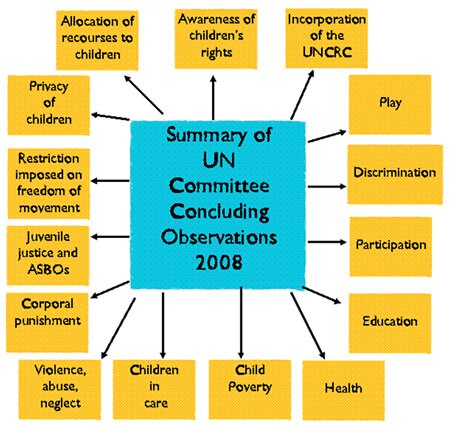Concluding Observations 2008

The UN Committee on the Rights of the Child cross-examined the UK Government and the devolved administrations at a hearing to review their record on children's rights, September 23rd/24th 2008 and published their Concluding Observations on October 3rd 2008.
Access the Concluding Observations here.
UN Committee on the Rights of the Child welcomed progress regarding:
- Withdrawal of the reservations to article 37(c), detaining children with adults and article 22 treating asylum seeker children and refugees differently to citizen children.
- The adoption of legislation relating to children’s rights including the Children’s Act 2004, the Child Care Act 2006.
- The creation of the Equality and Human Rights Commission.
- The fact that there have been instances where the Convention has been referred to in the domestic courts.
- Commitment of the National Assembly in Wales to prohibiting all corporal punishment in the home, but noted under the terms of devolution it is not possible for the Assembly to enact legislation.
- The Welsh Assembly Government's commitment to fulfilling children’s right to play.
- The Westminster and devolved Government’s commitment to end child poverty by 2020 and that this target will be enforced through legislative measures.
Summary of the key concerns of the UN Committee
- Incorporation of the UNCRC - The lack of incorporation of the UNCRC into domestic legislation and that the UNCRC should be incorporated into the British Bill of Rights.
- Allocation of resources to children - Insufficient increases in expenditure to the maximum extent of available resources to eradicate child poverty and inconsistent budgetary analysis and children’s rights impact assessments to identify how much expenditure is allocated to children.
- Awareness of children’s rights - No systematic awareness raising of the Convention and the level of knowledge among children, parents and professionals working with children is low and is not sufficiently incorporated into the curriculum in schools.
- Discrimination - Continuing discrimination against groups of children, Roma and Irish Travellers’, migrant and asylum-seeking and refugee children, lesbian, bisexual, gay and transgender young people (LGBT), children belonging to minority groups, disabled children.
- Intolerance towards children - The general climate of intolerance and negative public attitudes towards children and young people.
- Participation - Little progress to enshrine article 12 in education, law and policy or to ensure the rights in article 12 are given to children with disabilities and additionally that Funky Dragon must be appropriately supported.
- Restriction imposed on freedom of movement and peaceful assembly of children with regards to ASBOs and mosquito devices.
- Corporal punishment - The failure of the UK Government to explicitly prohibit all corporal punishment.
- Children in care – Insufficient investment in staff and facilities, children being taken into care due to low parental income, increased numbers of children from ethnic minorities and children with disabilities in care, inadequate monitoring, frequent movement of children, limited access for children to child complaint mechanisms.
- Violence, abuse and neglect – High prevalence in the home and still no comprehensive strategy, system of recording and analysing abuses against children, or comprehensive training for all professionals working with children.
- Health – Widening inequalities between the rich and the poor, limited access to appropriate mental health services for children and young people, high rate of teenage pregnancies for girls from lower-socio-economic background, high incidence of alcohol and drugs.
- Child Poverty – Poverty is still a serious problem and the Government strategy is not sufficiently targeted at those groups of children living in the most severe poverty.
- Education – Inequalities in school achievement, children’s fulfilment of their right to participate and complain is limited, bullying still a serious and widespread problem, number of exclusions still high and particularly from groups who experience low achievement.
- Juvenile Justice – The low age of criminal responsibility (10 years), the number of children deprived of liberty and on remand is too high and children in custody do not have a statutory right to education.
The Welsh Assembly Government have developed the National Action Plan 'Lets Get it Right' in repsonse to the Concluding Observations - click here for more information.